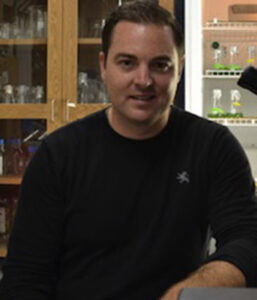MPH: Environmental Health Sciences MPH
Environmental health master’s students learn the biological, chemical and structural components of public health and how to put current research into practice.
Students’ experiences incorporate environmental health theories with crosscutting public health competencies, such as communication, public health biology, systems-thinking and leadership.
Program Type
Master’s
Program Format
On Campus
Making a Difference
“If there is one issue I could solve, it would be putting an end to environmental racism. As a person of color living on the south side of Milwaukee, I grew up in an area where we didn’t have green space or clean air due to living in a densely populated neighborhood.
To address environmental racism, we must demand environmental, racial and social justice. As a country, we need to work toward changing institutional policies, government decisions and regulations, and put an end to targeting communities of color.”
Michael Gonzalez, Jr, MPH-Environmental Health Sciences
Faculty for the environmental health master’s program are drawn from a number of departments and research units at UWM, giving students an unparalleled opportunity for cross-disciplinary training and the performance of novel research projects.
Laboratories and equipment are available across campus to promote innovative concepts in issues of environmental health sciences.
MPH Environmental Health Sciences (45 credits)
All students enrolled in the MPH program take a common set of core classes designed to give basic skills and knowledge of public health concepts. The core curriculum consists of at least 24-25 credit hours, including four credits for the Field Experience (3 credits) and Leadership in Public Health (1 credit) courses and a two-credit capstone seminar. In addition to the common core, students complete the required coursework in one of six specialization tracks (total program credits in parentheses): Biostatistics (46 credits), Community and Behavioral Health Promotion (48-49 credits), Environmental Health Sciences (45 credits), Epidemiology (49 credits), Public Health Policy (48 credits) or Nutrition and Dietetics (64 credits). Students must maintain a cumulative GPA of 3.0 or better in order to progress through the program.
MPH Required Common Core Courses (at least 24-25 credits)
| Course | Credits |
|---|---|
| PH 702: Introduction to Biostatistics | 3 |
| PH 703: Environmental Health Sciences | 3 |
| PH 704: Principles and Methods of Epidemiology | 3 |
| PH 705: Principles of Public Health Policy and Administration | 3 |
| PH 706: Perspectives in Community and Behavioral Health | 3 |
| PH 708: Health Systems and Population Health | 3 |
| PH 733: Overview of Qualitative Methods for Public Health | 1 |
| PH 790: Field Experience in Public Health | 3 |
| PH 791: Leadership in Public Health | 1 |
| PH 800: Capstone in Public Health | 2 |
MPH Environmental Health Sciences Required Courses (8 credits)
| Course | Credits |
|---|---|
| PH 743: Environmental Risk Assessment | 3 |
| PH 750: Seminar in Environmental Health Sciences | 2 |
| PH 762: Environmental Epidemiology | 3 |
Built Environment “S”electives — Choose one (3 credits)
| Course | Credits |
|---|---|
| ARCH 790: Special Topics | 3 |
| GEOG 520: The Physical Geography of the City | 3 |
| GEOG 880/URBPLAN 880: Urban Sustainability | 3 |
| GEOG 945: The Internal Structure of the City | 3 |
| IND ENG 580: Ergonomics | 3 |
| URBPLAN 791: Introduction to Urban Geographic Information Systems for Planning | 3 |
Other classes as approved by advisor.
Please note: All courses are subject to change. Please consult the Academic Catalog for the most up-to-date information.
Chemical Environment “S”elective – Choose one (3 credits)
| Course | Credits |
|---|---|
| PH 741: Environmental Public Health Microbiology | 3 |
| PH 745: Developmental Toxicology | 3 |
Other classes as approved by advisor.
Biological Environment “S”elective – Choose one (3 credits)
| Course | Credits |
|---|---|
| PH 741: Environmental Public Health Microbiology | 3 |
| PH 745: Developmental Toxicology | 3 |
Elective — Choose one additional course
You must choose from the Built Environment, Chemical Environment, or Biological Environment “S” electives listed above or other classes as approved by advisor.
Please note: All courses are subject to change. Please consult the Academic Catalog for the most up-to-date information.
MPH Environmental Health Sciences Track Competencies
- Describe genetic, physiological and overall human health effects of primary environmental hazards resulting from both chronic and acute exposures.
- Describe approaches for assessing, preventing and controlling environmental hazards that pose risks to both human and ecological health.
- Perform a risk assessment of an environmental health agent.
- Identify, locate and use appropriate reference materials.
- Comprehend the primary scientific research literature and obtain information directly from experts in the field of environmental health sciences.
Careers in Environmental Health Sciences
Graduates with environmental health master’s degrees work for health institutions at the city, state and national level. Other environmental health science job opportunities exist that look at the intersection of the built environment and human health, such as within the Department of Housing and Urban Development. Job growth for environmental health specialists is higher than average, according to the U.S. Bureau of Labor Statistics.
- Associate Professor, Environmental Health Sciences
- kalkbren@uwm.edu
- KIRC 5073
- Associate Professor, Environmental Health Sciences
- millertr@uwm.edu
- 414-229-5097
- KIRC 5053
- Associate Professor, Environmental Health Sciences
- svobodak@uwm.edu
- 414-229-7440
- KIRC 5049
Environmental Health Sciences Faculty Expertise
Our faculty have expertise and research in:
- Prenatal exposure to dioxin and related contaminants and the impact on children’s immune system health.
- Environmental and human health effects of anthropogenic chemicals, such as engineered nanomaterials.
- Factors that regulate human exposure to naturally occurring or anthropogenic toxins in water or wastewater.
- Nicotine toxicity and the developmental biology of nicotinic acetylcholine receptors.
Learn more about our environmental health sciences research.





